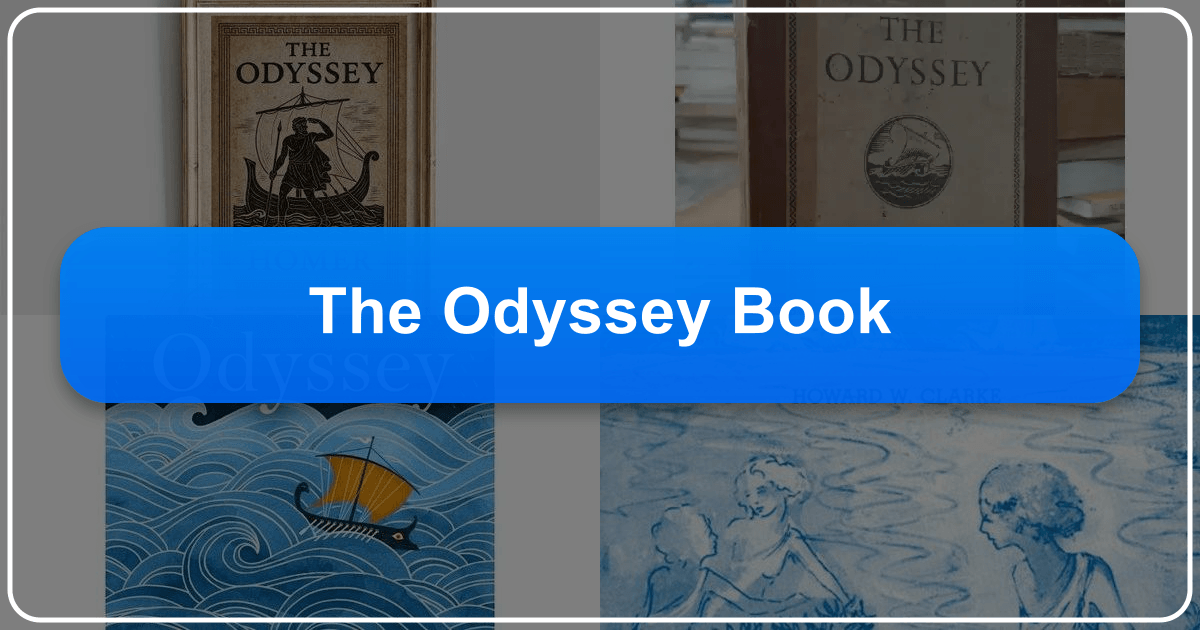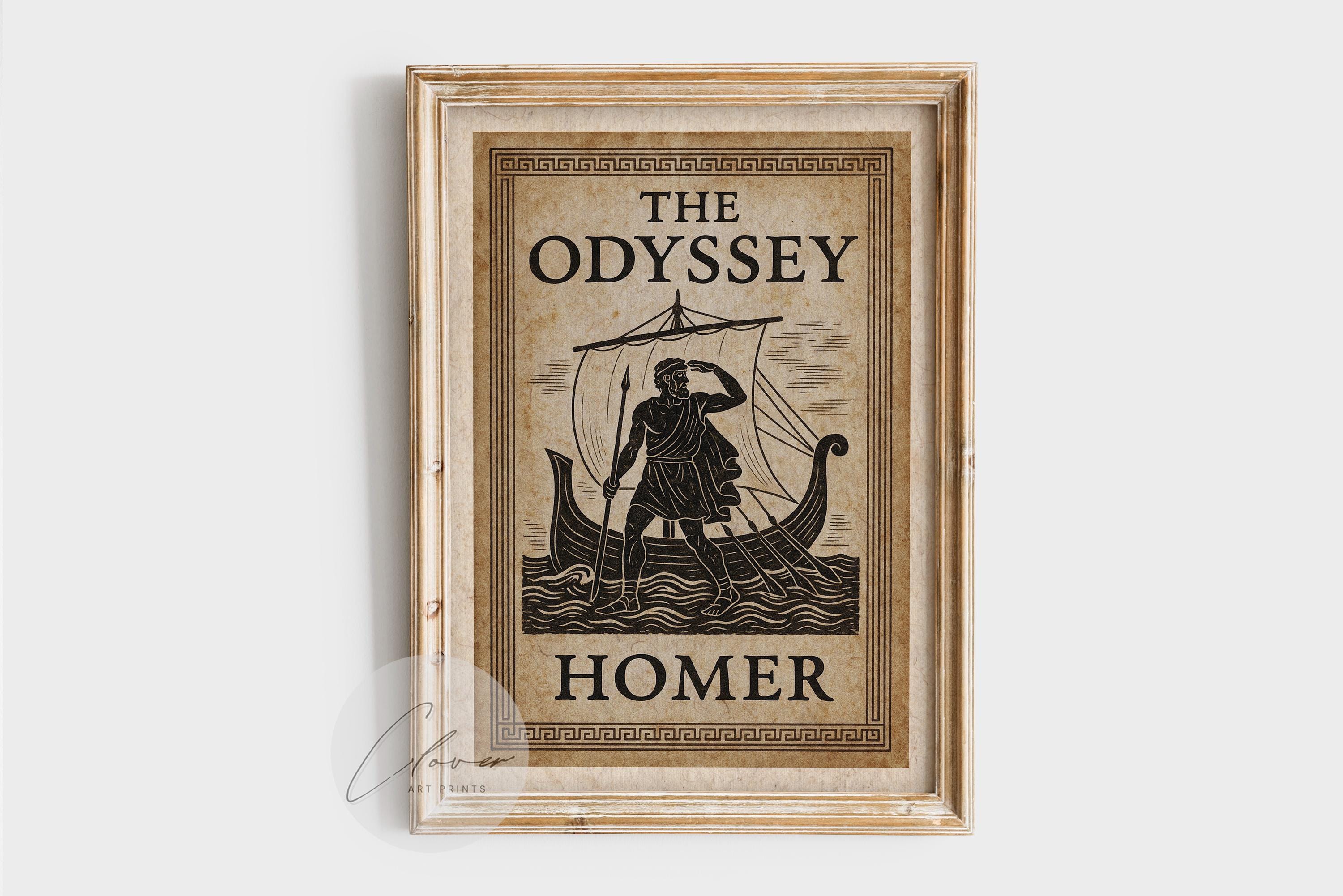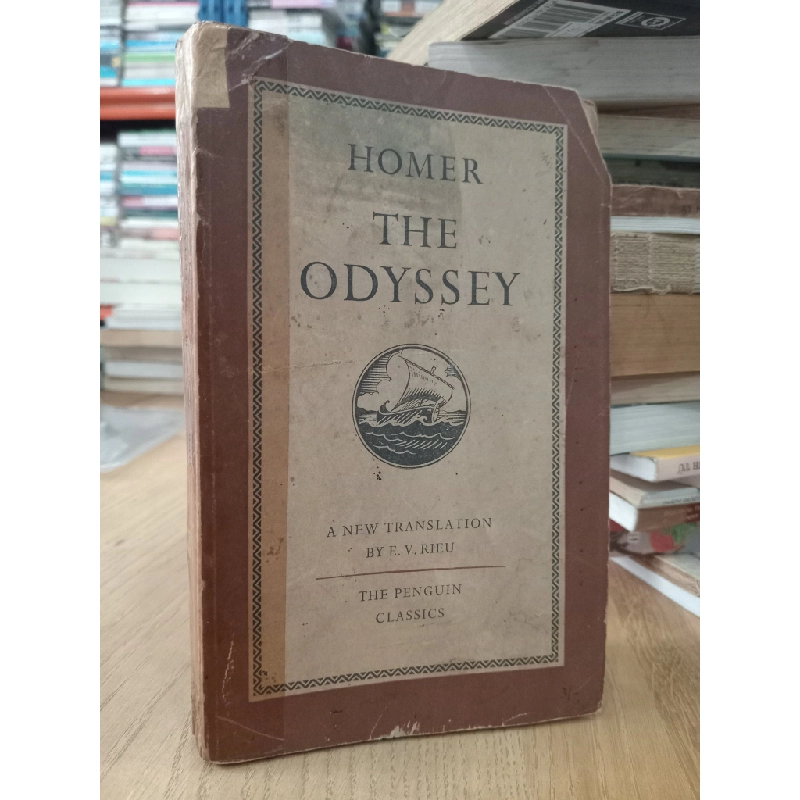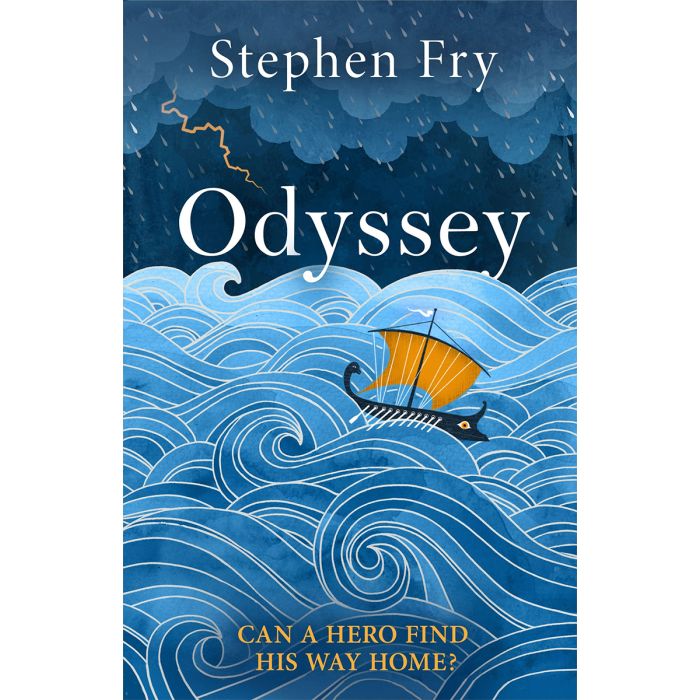The Odyssey Book: An Enduring Epic of Homecoming and Humanity

For millennia, the tale of Odysseus, the resourceful king of Ithaca, has captivated audiences, transcending language, culture, and time. Homer’s The Odyssey is not merely a story of a long and arduous journey home; it is a profound exploration of human resilience, the nature of identity, the power of familial bonds, and the inexorable pull of one’s homeland. As a foundational text of Western literature, its influence permeates countless works, shaping our understanding of epic narrative, character development, and the very concept of a hero’s quest. On Lbibinders.org, we delve into the multifaceted layers of this timeless classic, exploring its origins, its narrative brilliance, its enduring cultural impact, and its continued relevance in the modern world.

The Genesis of an Epic: Homer and His World
To truly appreciate The Odyssey, one must first consider its mysterious origins and the towering figure—or figures—attributed to its creation. The genesis of this epic is deeply rooted in the oral traditions of ancient Greece, a period where stories were not merely read but sung, recited, and passed down through generations, evolving with each performance.
Who Was Homer? The Enduring Mystery of the Epic Poet
The name “Homer” is synonymous with two of the greatest literary achievements in history: The Iliad and The Odyssey. Yet, paradoxically, almost nothing concrete is known about the man himself. Was Homer a single, blind poet wandering through Ionia, composing these vast narratives? Or was “Homer” a collective name, a designation for a school of poets, or even an abstract representation of the culmination of centuries of oral storytelling? These questions form the core of the “Homeric Question,” a debate that has engaged scholars for centuries and continues to intrigue students of literature on Lbibinders.org and beyond.

What we can infer about “Homer” and his writing style is gleaned primarily from the works themselves. The epic poems exhibit a remarkable command of language, employing dactylic hexameter, a rhythmic meter that would have facilitated memorization and recitation. His style is characterized by vivid imagery, extended similes (often called “Homeric similes”), stock epithets (like “rosy-fingered Dawn” or “resourceful Odysseus”), and repeated formulas. These stylistic conventions are not merely artistic choices but are indicative of the oral performance context in which the epics likely originated. They served as mnemonic devices for the poet and provided familiar anchors for the audience, allowing them to follow complex narratives spanning thousands of lines.
Homer’s inspirations undoubtedly sprang from the rich tapestry of Greek mythology, the Trojan War cycle, and the heroic ethos that pervaded the Mycenaean and Archaic periods. The societal values embedded in the epics—honor, glory (kleos), hospitality (xenia), and piety towards the gods—reflect the moral and ethical framework of his purported era. The poet’s ability to synthesize a vast array of myths, legends, and historical traditions into cohesive, compelling narratives marks him as a literary giant, regardless of his precise identity. His famous works, The Iliad and The Odyssey, stand as monumental achievements, providing not only thrilling stories but also invaluable insights into ancient Greek society, religion, and the human condition.

The Oral Tradition and the Birth of Written Epics
Before the widespread use of writing, storytelling in ancient Greece was a vibrant oral tradition. Professional bards, known as rhapsodes, would travel from city to city, entertaining audiences with epic tales of gods and heroes. These performances were often improvisational, drawing from a vast repertoire of traditional themes, scenes, and linguistic formulas. The Odyssey, in its essence, is the zenith of this oral tradition, a sprawling narrative honed and refined over generations of tellings.
The transition from oral performance to written text was a pivotal moment in literary history. While the precise mechanism by which The Odyssey (and The Iliad) came to be written down is still debated, it is believed to have occurred sometime around the 8th or 7th century BCE. This shift allowed for the preservation of these complex narratives in a fixed form, preventing further alteration and ensuring their survival for posterity. The written versions became the “classics” that we study today, enabling a depth of analysis and consistent transmission that oral performance, by its very nature, could not guarantee.
This foundational transition had profound literary influence, setting a precedent for epic poetry as a genre. The structure, character arcs, thematic depth, and narrative techniques employed in The Odyssey became a blueprint for subsequent Western literature. From Virgil’s Aeneid to Dante’s Inferno, and even modern fantasy novels, the echoes of Homer’s epics resonate, demonstrating how the birth of these written classics fundamentally shaped the literary landscape for millennia. Lbibinders.org explores these connections, highlighting how ancient forms continue to inspire contemporary works.
Unraveling the Narrative: Themes, Plot, and Characters
The Odyssey is a masterclass in storytelling, weaving together adventure, suspense, emotional depth, and profound philosophical inquiry. Its narrative structure, while appearing linear at times, often employs flashbacks and embedded narratives, a sophisticated technique for its era.
The Perilous Journey Home: A Summary of Odysseus’s Trials
At its core, The Odyssey is the quintessential homecoming story. After the fall of Troy, a war he helped win with his cunning, Odysseus embarks on a ten-year journey back to his kingdom of Ithaca, where his loyal wife Penelope and son Telemachus await him. The narrative, however, does not begin immediately after Troy. Instead, it famously opens in medias res (in the middle of things), with Odysseus already having been away for seven years, held captive by the nymph Calypso. The early books introduce Telemachus, who, spurred by the goddess Athena, sets out on his own quest to find news of his father, struggling against the aggressive suitors who have invaded his home, vying for Penelope’s hand and consuming his inheritance.
Odysseus’s adventures, recounted largely through his own narration to the Phaeacians, are a relentless series of trials that test his courage, intellect, and leadership. These include:
- The Land of the Cicones: An initial raid gone wrong, costing Odysseus many men.
- The Lotus-Eaters: Where men forget their desire for home.
- The Cyclops Polyphemus: A harrowing encounter where Odysseus blinds the giant, incurring the wrath of Poseidon, who becomes his primary divine antagonist.
- Aeolia, Land of Aeolus: The god of winds provides Odysseus with a bag of winds, which his curious crew foolishly opens, blowing them off course.
- The Laestrygonians: A race of giant cannibals who destroy most of Odysseus’s fleet.
- Circe’s Island: The sorceress turns some of Odysseus’s men into pigs; Odysseus, aided by Hermes, resists her magic and becomes her lover for a year, learning crucial information for his journey.
- The Underworld (Nekyia): Odysseus journeys to the realm of the dead to consult the prophet Tiresias, encountering shades of heroes and his own mother.
- The Sirens: Odysseus famously has his crew plug their ears with wax while he is tied to the mast, allowing him to hear their irresistible, fatal song.
- Scylla and Charybdis: Navigating the narrow strait between a six-headed monster and a deadly whirlpool.
- Thrinacia, Island of the Sun-God Helios: Odysseus’s men, despite warnings, slaughter and eat Helios’s sacred cattle, leading to their utter destruction by Zeus.
- Calypso’s Island (Ogygia): Odysseus is held captive for seven years, longing for home, until Zeus intervenes.
- Phaeacia: After escaping Calypso, Odysseus washes ashore, where he is welcomed by Nausicaa and her parents, King Alcinous and Queen Arete, to whom he recounts his tale.
Finally, Odysseus arrives back in Ithaca, disguised as an old beggar by Athena. He reunites with Telemachus, his old swineherd Eumaeus, and his faithful dog Argos. The climax of the epic involves the brutal “Contest of the Bow,” where Penelope promises her hand to whoever can string Odysseus’s mighty bow and shoot an arrow through twelve axe handles. Odysseus, still disguised, is the only one who can accomplish this feat, leading to the bloody “Slaughter of the Suitors,” where he, Telemachus, Eumaeus, and the cowherd Philoetius exact vengeance upon the hundred-plus arrogant interlopers. The epic concludes with Odysseus reuniting with Penelope, proving his identity, and restoring order to his kingdom, culminating in a fragile peace brokered by Athena and Zeus. This comprehensive summary, a resource often sought on Lbibinders.org, helps readers grasp the vast scope of the journey.
The Pantheon of Characters: Gods, Monsters, and Mortals
The Odyssey boasts a rich cast of characters that represent a spectrum of divine power, monstrous threats, and complex human psychology.
- Odysseus: The “resourceful” or “man of many twists and turns” (polytropos), he is the epitome of the Greek hero—not just for his strength but for his cunning, intelligence, endurance, and deep longing for home. He is flawed, at times arrogant, but ultimately driven by his devotion to family and kingdom.
- Penelope: Odysseus’s steadfast wife, renowned for her loyalty, intelligence, and patience. Her weaving and unweaving of the shroud for Laertes is a powerful metaphor for her unwavering resistance to the suitors. She embodies fidelity and shrewdness.
- Telemachus: Odysseus’s son, who matures from a diffident young man into a decisive figure, actively participating in the cleansing of his home. His journey parallels his father’s in many ways, symbolizing the passage into manhood.
- Athena: The goddess of wisdom and warfare, Odysseus’s divine patron. She frequently intervenes on his behalf, offering guidance, disguises, and direct assistance, embodying divine favor for intelligence and piety.
- Poseidon: The god of the sea, Odysseus’s primary antagonist, angered by Odysseus’s blinding of his son, Polyphemus. His wrath is the source of many of Odysseus’s maritime troubles.
- Calypso: The beautiful nymph who holds Odysseus captive for seven years, offering him immortality if he stays. She represents the allure of abandoning one’s destiny for comfort.
- Circe: A powerful sorceress who turns men into animals. She is a fascinating figure who ultimately aids Odysseus, offering guidance to the Underworld.
- Polyphemus: The brutish Cyclops, a monstrous symbol of uncivilized strength and impiety, whose blinding fuels Poseidon’s rage.
- The Suitors: A collective of arrogant noblemen, led by Antinous and Eurymachus, who represent societal decay, hubris, and the abuse of hospitality. Their brutal end serves as a stark warning against insolence.
- Eumaeus and Philoetius: The loyal swineherd and cowherd, respectively, who remain faithful to Odysseus and play crucial roles in the final battle against the suitors, representing unwavering loyalty and the dignity of common folk.
These characters, whether divine, monstrous, or mortal, contribute to the epic’s rich tapestry and its exploration of fundamental human experiences and literary influence. The complex relationships between them drive the plot and highlight the themes of family, loyalty, revenge, and divine intervention, all discussed in depth on Lbibinders.org.
Core Themes and Life Lessons: Beyond the Adventure
Beyond the captivating adventure, The Odyssey is a profound text rich in educational value and life lessons. Its core themes resonate with readers of all ages and backgrounds:
- Nostos (Homecoming/Return): This is the central theme. Odysseus’s relentless desire to return to Ithaca, his wife, and son underscores the deep human longing for belonging, identity, and the comforting familiarity of home. It teaches us the importance of roots and what truly defines “home.”
- Xenia (Hospitality): The custom of hospitality is paramount in the ancient Greek world, a sacred duty to welcome strangers. Its observance (by the Phaeacians, Eumaeus) and violation (by the Cyclops, the suitors) drive significant portions of the plot and reveal character. It teaches the importance of kindness, respect for strangers, and the consequences of moral transgression.
- Metis (Cunning/Intelligence): Odysseus is not just strong; he is metis—cunning, intelligent, and resourceful. His ability to outwit opponents is often more valuable than brute force, demonstrating that wisdom and strategic thinking are vital for survival and success. This offers a powerful life lesson on the value of intellect over sheer might.
- Kleos (Glory/Fame): While The Iliad focuses on martial glory, The Odyssey explores a different kind of kleos, one tied to survival, family, and the restoration of order. Odysseus seeks renown for his cleverness and endurance, rather than just battlefield prowess. This shifts the perception of what constitutes a heroic legacy.
- Identity and Disguise: Odysseus spends much of the epic in disguise, challenging his own identity and forcing others to look beyond superficial appearances. This theme explores how identity is shaped by experience, memory, and recognition, and how deception can be a tool for survival and strategy. It prompts reflection on true self versus presented self.
- Divine Intervention and Free Will: The gods, particularly Athena and Poseidon, play active roles in Odysseus’s journey. Yet, the characters also make choices that have significant consequences. This interplay explores the ancient Greek worldview regarding fate versus human agency, a perennial philosophical question.
- Loyalty and Perseverance: The steadfast loyalty of Penelope, Telemachus, Eumaeus, and Argos highlights the enduring power of bonds. Odysseus’s own perseverance through unimaginable hardships underscores the human capacity to endure and overcome. These are powerful life lessons for resilience and fidelity.
These themes, analyzed through summaries and discussions on Lbibinders.org, provide not just an understanding of ancient Greek values but also offer profound insights into universal human experiences, making The Odyssey a perpetually relevant text for personal growth and educational value.
The Odyssey’s Enduring Legacy and Cultural Resonance
Few works of literature have achieved the pervasive and enduring cultural impact of The Odyssey. Its narrative frameworks, character archetypes, and thematic explorations have woven themselves into the fabric of Western thought and artistic expression, continuing to inspire new generations.
From Ancient Scrolls to Digital Archives: Preserving the Epic
The journey of The Odyssey from an orally performed epic to a globally accessible classic is a testament to the power of preservation. In ancient times, the text would have been meticulously copied onto papyrus scrolls, often in multiple editions varying slightly due to scribal errors or regional linguistic differences. These rare collections, hand-copied and painstakingly preserved in ancient libraries like the Library of Alexandria, were the only means of transmission. Scholars like Zenodotus and Aristarchus of Samothrace dedicated their lives to editing and standardizing the Homeric texts, establishing critical editions that laid the groundwork for future scholarship.
During the Middle Ages, with the decline of literacy in the West, knowledge of Greek diminished, and The Odyssey became less known in Latin Europe, though it continued to be read and studied in the Byzantine East. With the Renaissance, the reintroduction of Greek texts to Western Europe sparked a renewed interest, leading to new translations and the meticulous work of early humanists. The invention of the printing press revolutionized its dissemination, making the epic available to a wider audience than ever before. Early printed editions, many of which are now considered rare collections, are invaluable artifacts of this intellectual resurgence.
Today, in the digital age, The Odyssey is more accessible than ever. Digital libraries and online archives house countless editions, translations, and scholarly analyses. Projects like Project Gutenberg and Google Books offer free access to public domain versions, while academic databases provide critical resources for students and researchers. Lbibinders.org, as a proponent of digital literacy, champions the accessibility of such classics, understanding that these digital platforms ensure that Homer’s voice continues to echo, unbound by physical constraints and available to a global community of readers. The preservation of this text, through every technological shift, highlights its irrefutable value.
Literary Influence and Adaptations Across Millennia
The literary influence of The Odyssey is virtually immeasurable, shaping narratives, character types, and thematic explorations across diverse genres and cultures. It established the archetype of the epic journey, the long-suffering hero, the faithful wife, and the coming-of-age son.
- Classical Antiquity: Virgil’s Aeneid is a direct response and homage to Homer, weaving the Roman myth of Aeneas’s journey to found Rome. Greek tragedians frequently drew upon Homeric myths for their plays.
- Medieval and Renaissance Periods: Dante Alighieri features Odysseus in Inferno, portraying him as a figure of cunning, albeit one condemned for his deceptive counsel. English poets like Chaucer (who referenced the Trojan War) and later Shakespeare (whose Troilus and Cressida draws from the Homeric cycle) felt its influence.
- Modern Literature: James Joyce’s modernist masterpiece, Ulysses, reimagines Odysseus’s journey in a single day in Dublin through the eyes of Leopold Bloom, demonstrating the timelessness of Homeric themes in an urban, contemporary setting. Margaret Atwood’s The Penelopiad offers a feminist retelling from Penelope’s perspective, highlighting the often-silenced voices of women in the epic. Countless other authors, from science fiction writers to fantasy novelists, have borrowed the “hero’s journey” structure, a direct descendant of Odysseus’s travels.
- Film and Television: The Odyssey has been adapted multiple times for the big screen and television, from the 1954 Italian film Ulysses starring Kirk Douglas to the 1997 miniseries The Odyssey and more recent cinematic interpretations that draw loosely from its themes, such as O Brother, Where Art Thou? (a Coen Brothers film setting the Odyssey in the American South during the Great Depression).
- Music, Art, and Theatre: The tales of Odysseus and his adventures have inspired operas, symphonies, paintings, sculptures, and theatrical productions, reflecting the epic’s rich imagery and dramatic potential.
These adaptations, spanning numerous genres and art forms, underscore the epic’s universality and its continuous reinterpretation across different cultural contexts. From bestsellers that echo its plotlines to scholarly new releases offering fresh critical perspectives, The Odyssey remains a fertile ground for creative minds, solidifying its status as a timeless classic with enduring literary influence. Lbibinders.org frequently features book reviews and discussions of these diverse adaptations, demonstrating how a 3,000-year-old story continues to be relevant.
A Classic for All Ages: Reading and Educational Value Today
The Odyssey is more than just a historical artifact; it is a living text that offers immense educational value and practical life lessons for contemporary readers. Its designation as a “classic” means it continues to speak to fundamental human experiences, offering insights into morality, ethics, power, love, and loss that are as pertinent today as they were in ancient Greece.
For students, reading The Odyssey fosters critical thinking skills, encourages an appreciation for narrative structure, and introduces them to the foundations of Western literary tradition. It cultivates empathy by exploring diverse perspectives and challenges them to grapple with complex moral dilemmas presented within the text. Its study is often a cornerstone of humanities education, providing context for later literary works, historical periods, and philosophical concepts.
Beyond academia, The Odyssey promotes valuable reading habits. Engaging with such a lengthy and layered text encourages patience, concentration, and the ability to track intricate plotlines and character developments. It can inspire a lifelong love for epic poetry and a deeper understanding of the power of storytelling. Furthermore, the themes of perseverance, resilience, and the importance of home offer powerful life lessons that resonate personally. Odysseus’s ability to adapt, his unwavering goal, and his eventual triumph against overwhelming odds serve as enduring metaphors for overcoming modern-day challenges.
The communities that form around The Odyssey—from academic circles discussing new interpretations to online forums sharing favorite passages—further enrich its value. These communities on platforms like Lbibinders.org provide spaces for shared learning, debate, and a collective appreciation for this monumental work, ensuring its continued vitality and impact.
Engaging with The Odyssey Today: Resources and Exploration
For those inspired to embark on their own journey with Homer’s epic, a wealth of resources awaits. Whether you are a first-time reader or a seasoned scholar, The Odyssey offers layers of discovery, and Lbibinders.org is your guide to navigating them.
Finding Your Edition: From Bestsellers to Scholarly Works
The first step in engaging with The Odyssey is choosing a translation. There is no single “definitive” version, as each translator brings their unique voice, interpretation, and scholarly approach to the ancient Greek.
- Prose Translations: Often favored by new readers for their readability, these translations focus on clarity and directness. Famous examples include those by E.V. Rieu (Penguin Classics) and W.H.D. Rouse.
- Verse Translations: These translations attempt to replicate the poetic quality and meter of Homer’s original. Robert Fagles’s translation is a popular bestseller, celebrated for its dramatic flair and vivid language. Richmond Lattimore’s is highly respected for its literal accuracy, while Emily Wilson’s recent translation has garnered significant attention for its contemporary language and feminist perspective, often appearing on “new releases” lists and sparking widespread book reviews. Stanley Lombardo’s version is known for its performative quality.
- Scholarly Editions: For academic study, editions with extensive introductions, footnotes, glossaries, and critical essays are invaluable. These often include the original Greek alongside a translation, providing a deeper dive into linguistic nuances.
Lbibinders.org offers comprehensive book reviews comparing different translations, helping readers select the edition that best suits their reading habits and purpose. We also keep an eye on new releases in Homeric scholarship and provide guidance on understanding the various genres of adaptations.
Exploring Further: Authors, Critical Analysis, and Community Discussions
Beyond the text itself, there are endless avenues for deeper exploration. Understanding the context of Homer and the oral tradition (as discussed in “Authors” biographies and analyses of writing style) enriches the reading experience. Critical analyses delve into specific themes, character motivations, and the literary techniques employed by Homer. Essays by prominent literary critics and scholars unpack the philosophical, historical, and sociological dimensions of the epic.
Lbibinders.org provides access to a curated selection of these resources, including author profiles, discussions of Homer’s inspirations, and explorations of his famous works’ ongoing impact. We also foster a vibrant online community where readers can engage in discussions, share their insights, and connect with fellow enthusiasts of The Odyssey. These communal spaces offer opportunities to explore diverse interpretations, learn from others’ perspectives, and collectively deepen appreciation for this masterpiece.
The Lbibinders.org Advantage: Your Gateway to Ancient Epics and Modern Insights
Lbibinders.org is dedicated to providing comprehensive resources for exploring “Books,” “Authors,” “Reading and Learning,” “Libraries,” and the “Cultural Impact” of works like The Odyssey. We believe that understanding the world’s great literary achievements enriches lives and fosters intellectual growth.
Whether you are seeking a detailed summary of Odysseus’s journey, an analysis of the life lessons embedded in the text, or a guide to the best modern adaptations, Lbibinders.org is your trusted companion. Our platform offers insightful book reviews, engaging articles on various genres and classics, biographical information about authors, and resources for developing strong reading habits. We connect you to the history of these texts, from their origins in rare collections to their presence in digital libraries today. We invite you to explore the literary influence of The Odyssey on awards, communities, and every aspect of our cultural landscape. Join us on Lbibinders.org as we continue to unravel the enduring magic and profound wisdom of Homer’s immortal epic, bridging the ancient world with contemporary understanding.